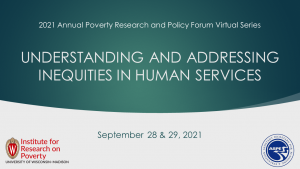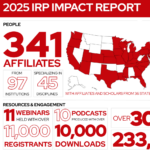Events
- March
- March 9Shifting Administrative Burden through Universal Free Lunch: Effects on Political Support for SchoolsHousehold Finance Seminar, cosponsred with IRP - Meredith Dost1:15 PM, 1199 Nancy Nicholas Hall
- March 10Measuring the Association Between Federal Income Transfer Program Expenditures and Nonprofit Human Services ExpendituresInstitute for Research on Poverty Lunch & Learn - Shoshana Shapiro12:15 PM, 3470 Sewell Social Sciences
- March 11Supporting Fathers and Their Families Surrounding SeparationInstitute for Research on Poverty Webinar - Tova Walsh, Matthew Alemu, Clinton Boyd, Jr., Pajarita Charles, and Jonathon Gonzales12:00 PM, Online
- March 12Implementing a Trauma Screening Protocol within TANF and Other Employment ServicesInstitute for Research on Poverty Seminar - Dimitri Topitzes12:15 PM, 8417 Sewell Social Sciences
- March 19Labor Market Effects of the Tax Cuts and Jobs ActInstitute for Research on Poverty Seminar - Anil Kumar12:15 PM, 8417 Sewell Social Sciences
- March 26Social Disadvantage and Legal Representation in the North Carolina Judicial SystemInstitute for Research on Poverty Seminar - Marty Davidson12:15 PM, 8417 Sewell Social Sciences
Highlights from the National Research Center on Poverty and Economic Mobility
 This Forum investigated inequitable outcomes by race, ethnicity, sexual orientation, gender identity, sex, and ability and how federal, state, and local human services policies, systems, and providers contribute to it. Participants also discussed how policy, practice, data, and research can combat systemic inequities created in and outside of human services. Inequities continue to create barriers to success and well-being for many individuals and communities in the United States. The field of human services can play a crucial role in advancing equity for these populations, but to do so must identify the ways in which it creates or perpetuates disparities.
This Forum investigated inequitable outcomes by race, ethnicity, sexual orientation, gender identity, sex, and ability and how federal, state, and local human services policies, systems, and providers contribute to it. Participants also discussed how policy, practice, data, and research can combat systemic inequities created in and outside of human services. Inequities continue to create barriers to success and well-being for many individuals and communities in the United States. The field of human services can play a crucial role in advancing equity for these populations, but to do so must identify the ways in which it creates or perpetuates disparities.
Medicaid & Health Policy Research
Health Coverage, Access, Cost, & Quality
Research and analysis projects focus on health care access, cost, financing, health system performance, quality — in short: What works? Who benefits? Who pays?


